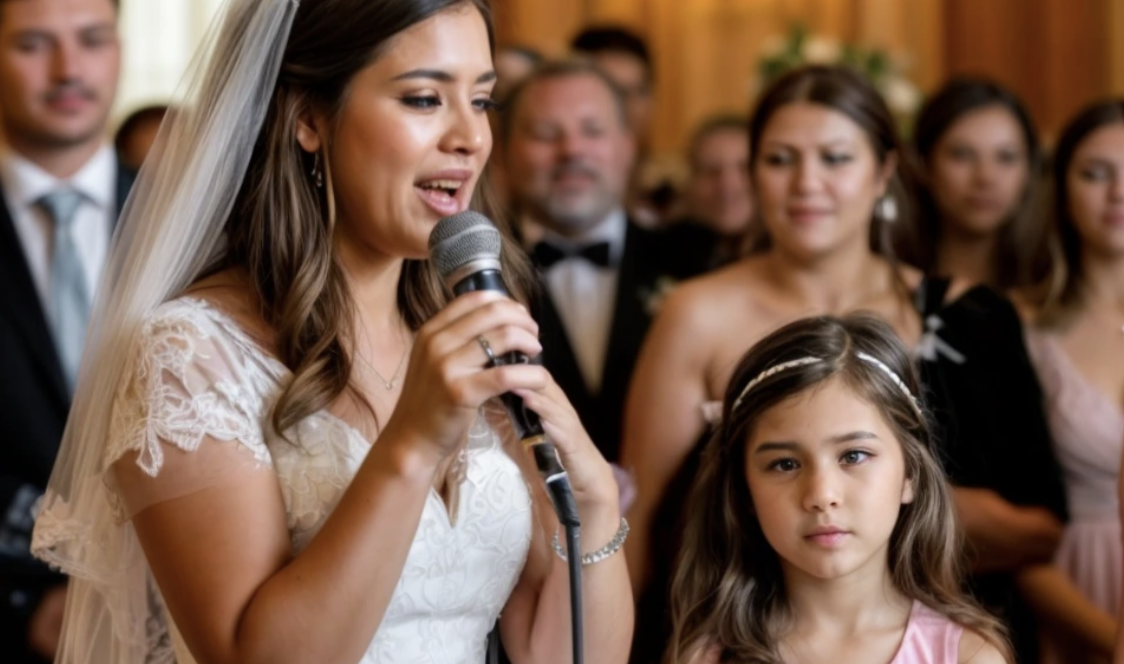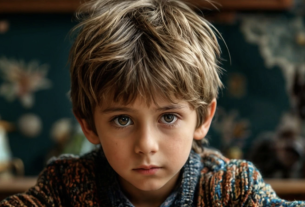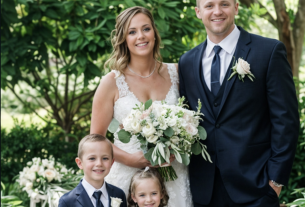— “Sveta, you look absolutely stunning in that dress!” her friend exclaimed, taking in the bride. “We’ll do your hair next—and you’ll look like a real princess!”
Svetlana ran a thoughtful hand through her hair, looking at herself in the mirror.
“Maybe I should dye it darker? What do you think?”
“Absolutely not! Dark shades will age you right away,” Olga objected. “Right now you look like a playful young thing, and with that kind of mop you’ll end up looking like some auntie from the housing office!”
“Olya, I’m already twenty-nine,” Sveta said seriously, turning to her friend.
“No way?! You’d never know it. You look ten years younger. Just make sure your husband doesn’t add those ten years back on after the wedding!” She laughed.
The friends giggled, but there was a grain of truth behind the joke.
Sveta was in that pre-wedding flutter—only a few little details left to settle, and everything would be ready for the big day. She had always dreamed of this kind of wedding: a cozy courtyard at a country house, live music, lots of guests, open doors for anyone who wanted to share their joy. Money wasn’t an issue—Sveta supported herself, and her fiancé Andrey wasn’t poor either: the son of influential parents, and a successful lawyer in his own right, long established among major companies.
The bride and groom were both tall, slender, fair-haired, and blue-eyed—an ideal pair, almost like twins.
There were many guests. Some they were seeing for only the second time in their lives, but they were happy to welcome everyone—each person added to the fun and scale of the celebration.
A stage with sound equipment had been set up at the entrance to the yard. Anyone could come up to the microphone to congratulate the couple or sing a song. A DJ sat nearby with a whole collection of instrumental tracks.
Sveta herself wasn’t a stranger to music—she loved to sing and write songs. At some point friends started coaxing her to go up on stage.
“Come on, Sveta! Show the guests your talent!” people shouted from the crowd.
“She doesn’t just sing—she writes everything herself!” added a plump, middle-aged woman.
It felt awkward to refuse. Sveta took the microphone. When her warm, mid-range voice rose over the courtyard, everyone fell still. Most were hearing her for the first time—and were amazed. After the first song they asked for a second, then a third. All the pieces turned out to be her own—both lyrics and music. The guests were moved to the core. Some of the ladies’ eyes shone with genuine emotion.
“She’s a star!” they murmured to one another. “Bravo! Such talent!”
Sveta blushed with embarrassment, but her smile grew even warmer. She bowed, thanked everyone, and began to step down from the stage.
And suddenly she noticed a child—a little girl of about six. At a glance it was clear she was there by chance.
“She’s probably asking for alms,” flashed through Sveta’s mind.
Coming down, Sveta went to the table, filled a small bag with sweets, and called to the girl:
“Come here, sweetheart! Here, this is for you. You’re such a cutie! Like a little doll. How about we take a picture together?”
The little one obediently followed her up to the stage. They stood side by side and smiled for the camera.
“Mommy… why are you dressed so beautifully today?” the girl suddenly asked.
Sveta was taken aback.
“I’m not your mom, darling. We’re meeting for the first time, aren’t we?”
“So now we’re going to have a dad?” the girl went on, as if sure of something of her own. “And how are you feeling? Do you feel better?”
A chill ran over Svetlana’s skin.
“Sunshine, you’re definitely mistaken. I don’t know you at all, really,” she said, trying to stay kind. “Maybe you got lost?”
But the child didn’t back down. She looked at Sveta with a strange certainty. And then she said her mother’s name… and Sveta turned to stone. It was her name.
“It’s you… mama Lena!” the girl said, looking at Sveta.
Svetlana went pale and clutched at the mic stand, as if it were the only thing keeping her on her feet.
“What are you saying?” she whispered, her voice treacherously shaking. “What name… I don’t understand… Could it be…”
Her knees buckled; her head felt weightless, as if it were about to detach from her body and float away. Under the guests’ astonished looks, the bride collapsed on the stage and lost consciousness.
And just before she fell into darkness, something flickered: as if someone had flipped through her memory like a book of recollections. A distant childhood rose before her eyes—the brightest and the most terrible.
She was seven then. Their neighbor, Grandma Masha, ran to their house and brought news of a dreadful car crash. Their parents were gone. But a child can’t fully grasp the scale of such a loss—the nature of little ones shields them from losses that are too big.
With the years, the memories grew sharper. And the pain—deeper. The neighbor took them in like her own. They all lived together for three years, until the old woman suddenly died of a heart attack. After that, the girls ended up in an orphanage.
Life in the home was not as awful as they had imagined. The caregivers knew their story and tried to be gentler. On holidays they were given more sweets than the others. Sveta looked after Lenka, especially when she cried at night with her face buried in the blanket. Then the older sister would stroke her head and whisper:
“Everything will be all right. We’re together, aren’t we.”
Sveta had always loved to sing. She sang the lullabies their mother used to sing. For Lena, those songs were a window into the past—into warmth, into family. They helped her feel connected to what had long since disappeared.
Years went by. In the lives of orphans, time moved slowly but predictably. Until one day the director appeared in the orphanage sitting room with a thick black folder. That meant only one thing—maybe a new life was about to begin.
One day a wealthy couple approached them. They wanted a girl of about ten or eleven, fair-haired. Sveta fit perfectly. They didn’t even consider Lena.
The director tried to bargain, begged them to take both. But the couple was adamant:
“No, we want just one. She needs to look like our daughter.”
He faced a hard choice: separate the sisters for the sake of one girl’s chance, or leave them together in the home. He decided to lie. Sveta and Lena were told that the older one would go first, and in a week the younger would follow.
Sveta agreed—only so as not to upset her sister. She hugged Lena and whispered:
“Don’t worry. When I turn eighteen, I’ll find you. I promise. We’ll be together again.”
Outwardly she held herself together, but inside everything was clenched in pain. “Don’t cry. Don’t show it,” she kept telling herself as she let go of the person closest to her.
And so they parted. And no one ever came for Lena. Not in a week, not in a month. The director was racked with remorse, but there was nothing he could do.
Years passed. Sveta grew up, got an education, a career, love. Her adoptive parents gave her everything—a roof over her head, care, warmth. But one thought gave her no peace: where was Lena now?
She hired detectives, searched, called, asked around. No result. The documents had burned, the staff had changed, the trail was cold.
And now, at her own wedding, Sveta heard the words that knocked the strength from her:
“It’s you, mama Lena!”
The little girl had spoken her sister’s name. Sveta couldn’t believe her ears. Could it be a coincidence? Or something more?
Her world collapsed. She fainted before she could make sense of anything.
When they brought her around, the first thing she whispered was:
“Where is she?.. Who is she?!”
“Who?” Sveta asked, bewildered.
“The girl… there was a girl here!” Andrey repeated, still shaken by what he’d seen.
“She’s right here, standing next to us,” he answered, a little irritated. “You’d better tell me—how do you feel? Does anything hurt?”
“Calm down, Andryusha, I’m fine, really. I just… got a little overwhelmed.”
With her husband’s support, Sveta got to her feet, thanked the guests for their concern, and, taking the child by the hand, led her aside—somewhere they could talk out of sight.
“Sweetheart, tell me—who is your mom?” she asked, trying to keep her voice steady.
“You look so much like her… I thought you were her…”
“And where is she now?” Sveta interrupted, seized by a troubling premonition.
“She’s in the hospital,” the girl whispered. “There’s something bad inside her, and she needs an operation to get rid of it.”
Sveta froze.
“And you were out alone?” she almost whispered.
“Dad left a long time ago, there’s nothing left at home… I went out to ask for help…” the girl’s voice quivered.
“My poor thing…” The bride’s heart clenched with pity. She hugged the child tightly. “Don’t be afraid anymore. You’re not alone now. Do you hear me? You’re not alone. Now tell me—what’s your name?”
“Sveta,” the little one replied.
The name pierced Sveta to the core. It all lined up too strangely, too symbolically. She realized: this couldn’t be a coincidence.
She decided to act at once. After calling around to several clinics, she found a promising match—a woman with a similar story was in one of the city hospitals. The last name was different, but it could have changed after marriage. This was her chance.
Without losing a minute, Sveta changed clothes, called a taxi, and—leaving bewildered guests and, above all, Andrey—raced to the hospital. Something else mattered more now—eighteen years ago she had lost her sister, and now she might have found her again. And she was ill. And needed her.
It really was Lena. Even gaunt, her face was a mirror of Sveta’s. They were so alike they seemed like two drops of water.
“Lenočka! I’ve been searching for you for so long…” Sveta pulled her sister close, unable to hold back her tears. “You can’t imagine how happy I am to see you!”
Lena was weak; she couldn’t respond with the same joy. She only smiled faintly.
“I’m undergoing chemo now… and I need an operation…”
“Don’t worry about anything!” Sveta said firmly. “I’ll arrange everything. Just get better, Lenočka, please! I’ve been looking for you for so long… I need you so much!”
They cried and hugged until the doctor asked them to end the visit. Sveta stepped into the corridor, sank onto a bench, and closed her eyes. She had to pull herself together. Think. Decide.
“Think, Sveta. This is your last chance,” she repeated to herself.
Jumping to her feet, she went to the head physician. With a voice full of hope and resolve, she arranged a VIP room for her sister, paid for the best medications and the most advanced surgery.
“Do everything possible and impossible,” she begged. “I’ll pay any money. Just save her. I need my sister.”
The doctors shook their heads. The odds were minimal. But Sveta wouldn’t give up. Every day she sat by Lena’s bed, held her hand, and sang the same lullabies she used to soothe her with in childhood. Later Lena confessed:
“I heard an angel singing. And I followed that voice… out of the darkness. It led me back.”
After many long months of treatment, Lena began to recover. She moved in with Sveta and little Svetlana—the girl who had found them at the wedding. Andrey accepted the sister’s decision kindly. The house was spacious, and their hearts—more spacious still.
Time passed. Lena met someone who wanted to be by her side. And Sveta learned she was expecting a child—just when the family became whole.
And if not for that chance meeting, if not for the little girl who mistook Sveta for her mother… they might never have found each other.



